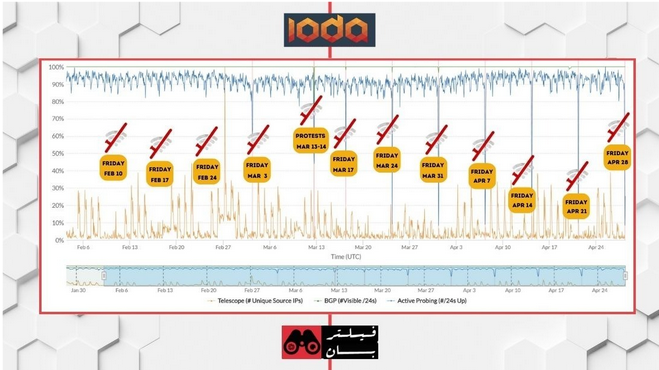On May 03, 2023 Miaan Group along with 23 other organization and prominent human rights activists released an statement to condemn internet shutdown in Sistan and Baluchestan.
Statement:
We, the undersigned organizations, and members of the #KeepItOn coalition — a global network of over 300 human rights organizations from 105 countries working to end internet shutdowns — write to urgently draw attention to the ongoing human rights violations taking place in Iran’s Sistan and Baluchestan province. We urgently appeal to the international community to join our call to the government of Iran to stop imposing internet shutdowns to cover up human rights abuses taking place in the province.
For more than three months, the people of Iran’s Sistan and Baluchestan province, particularly its capital city of Zahdan, have been enduring internet shutdowns every Friday, coinciding with Friday prayers and protests held at the same time. This ongoing disruption to the internet has resulted in significant challenges for the local community, who heavily rely on online communication for their daily activities.

Protests initially broke out in Zahedan on 30 September 2022, now referred to as “Bloody Friday,” following the tragic death of Mahsa Jina Amini. According to Haalvash, a Baluchi human rights organization, at least 103 people, including at least 14 children, were killed, and dozens of others were wounded in Zahedan on this day, though the actual figures may be much higher. Since then, the people of Zahedan and other cities in Balochistan have taken to the streets every Friday, demanding justice.
In response to the ongoing protests, the Iranian government has resorted to various measures to suppress the demonstrations, including throttling mobile data in the province, especially in areas where protests are taking place.
Filterwatch, a project focused on investigating and researching internet policy and connectivity in Iran, has been closely monitoring these internet disruptions, which have occurred almost every Friday since 10 February 2023. According to information shared by local sources in Zahedan with Filterwatch, mobile connectivity experienced a near-total shutdown between 12:00 and 1:30 pm local time on 28 April, followed by severe internet disruptions. These actions by the Iranian government raise serious concerns about the violation of the rights of the people in Iran.
Prominent Sunni cleric Abdolhamid Ismaeelzahi of the Makki Mosque in Zahedan, who often critiques the government in his Friday prayer speeches, has seen his Instagram and YouTube channels impacted by these internet disruptions. Worrisome, the shutdowns have begun to affect not only mobile data but also fixed internet connections.
The Iranian government has a well-documented record of using internet shutdowns to silence dissent and crackdown on protests across the country. Filterwatch is deeply concerned about the ongoing use of targeted internet shutdowns in Sistan and Baluchestan, which not only violate freedom of expression but also serve to cover up human rights violations.
According to Article 35 of the International Telecommunication Union (ITU), of which Iran is a state party, member states have the right to “suspend telecommunication service, either generally or for ‘certain kinds of correspondence.’” However, such states are responsible for “immediately notifying” other state parties and the Secretary-General immediately upon suspending access.
We urge the ITU and Secretary-General, in compliance with Article 35 of their constitution, to call on Iran to clearly and publicly denounce, pressure the Iranian government to stop shutting down the internet, and provide an explanation to its citizens and the general public for this action. Furthermore, we request that the ITU’s annual report rankings take into account the consequences of such internet shutdowns on the affected communities.
We call for greater scrutiny of the Iranian government’s human rights abuses, including efforts to silence its citizens. The people of Sistan and Baluchestan deserve the right to express themselves freely, without fear of retribution.
Signatories
Organizations:
- Miaan Group
- Femena
- Haalvash, Baloch Human Rights Organization
- PEN America
- Ubunteam
- OPTF Ltd
- Change Tanzania Movement
- Center for Advancement of Rights and Democracy (CARD Ethiopia)
- Digital Rights Kashmir
- Xnet (Spain)
- Innovation for Change (I4C) South Asia
- Internet Policy Observatory Pakistan
- I4C Center for Artificial Intelligence and Human Rights (I4CAIHR)
- Advocacy Initiative for Development (AID)
- Bloggers Association of Kenya (BAKE)
- Baloch Activists Campaign
- Office of Civil Freedoms
- Association for the human rights of the Azerbaijani people in Iran (AHRAZ)
- Civic Initiatives, Serbia
- United for Iran
- Center For Human Rights in Iran
- Center For Supporters of Human Rights
- Access Now
Individuals:
- Shirin Ebadi, Nobel Peace Prize Laureate
- Arzak Khan, Digital Rights Activist
- Cristiana Ximenes Belo
- Fariba Balouch, Human Rights defender
- ShirAhmad Shirani Naroui, Human Rights Defender and Chief Editorial of Haalvash

